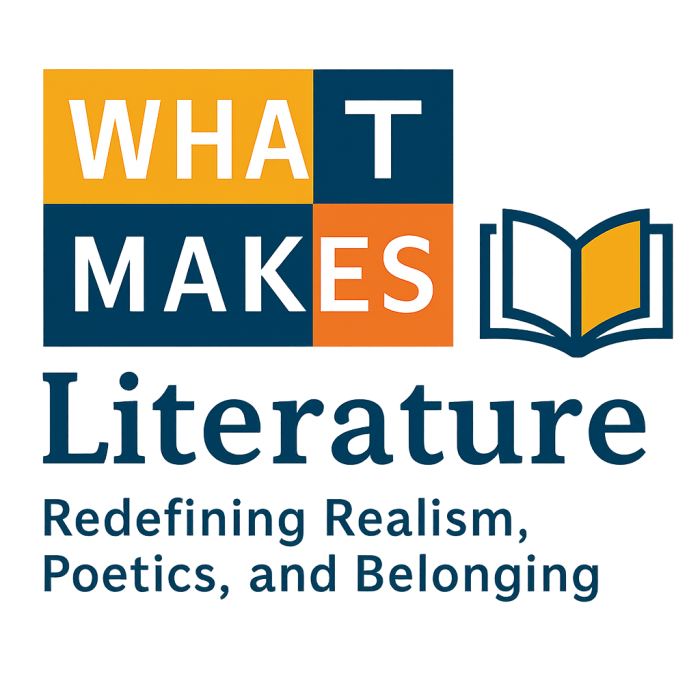Call for Papers
The international conference What Makes Literature: Redefining Realism, Poetics, and Belonging invites scholars to discuss how realism, poetics, and belonging intersect in literary theory and practice. We explore literature as a dynamic field of aesthetic and ideological negotiation shaped by shifting imaginaries, identity formations, and contested regimes of attachment across both synchronic and diachronic perspectives. We particularly welcome work that examines how literary practices since the nineteenth century have reflected, produced, and questioned cultural frameworks in national and transnational contexts.
Two converging lines of inquiry guide the event. First, we see literature and poetics as evolving spaces that rethink national identity, cultural inclusion, and belonging, while simultaneously assessing what defines a cultural tradition and how it is situated today. Second, we approach realism as a consistent yet flexible practice attuned to social transformation and aesthetic experimentation. We see realism as a performative, contested mode whose interplay with other trends demonstrates literature’s capacity for critical analysis, social imagination, and change. We look to explore how small literatures and peripheral realisms contribute to an inclusive understanding of the contemporary world and its historical legacies, comprising postcolonial and post-Soviet conditions, gendered perspectives, and historical traumas. The conference also considers literary production and reception within today’s digital environments, examining how platforms and reading technologies shape the social role of literature.
Proposed Streams
1. Mapping Realism: Psychological, Formal, and Spatial Trajectories
This stream examines the evolution of literary realism from its early roots and nineteenth-century developments to contemporary reconfigurations. We invite contributions on the psychological depth of realism, its referential and documentary practices, formal innovations, and geographical reach across both canonical and peripheral traditions.
2. Cross-Border Poetics: Creation, Circulation, and Reception of Literary Forms
Focusing on the multiple origins of literary forms and their diverse movements across linguistic and cultural borders, this stream addresses the poetics of literary texts. We welcome discussions of the aesthetic preconditions for textual functionality and reception that extend beyond local and nation-state frameworks, as well as the role of intersecting poetic trends in shaping regional and broader literary networks.
3. Belonging and Its Discontents: Identity, Inclusion, and the Politics of Culture
This theme investigates how literature, historical and contemporary, shapes, challenges, and complicates notions of identity, cultural inclusion and exclusion, collective memory, trauma, and gender. We especially encourage proposals on texts that explore cultural diversity and contest various regimes of belonging. Approaches that connect textual analysis with institutions, policies, and readerships (such as libraries, school curricula, censorship regimes, and cultural diplomacy) are welcome.
4. Digital Literatures and Reading Cultures in the 21st Century
This stream examines how digital media, platforms, and reading technologies shape literary production, distribution, and reception today. We invite papers on digital poetics, online literary communities, algorithmic influence, and changing forms of literacy in the digital age. Case-driven studies that link digital infrastructures to concrete shifts in poetics and literary value are particularly welcome.
Format and Practicalities
- Venue & language: In person, Riga; working language: English.
- Hosts: Institute of Literature, Folklore and Art (UL) as part of its 80th-anniversary year.
Submissions
Please submit (a) an abstract (max 300 words), (b) your intended stream (1-4), and (c) a short bio with affiliation and email to conferences@lulfmi.lv by 12 February 2026.
Notifications: by 12 March 2026.
Preliminary programme: by 31 May 2026.
Registration Fees
-
Early (through 15 May 2026): EUR 140 (academics) / EUR 100 (PhD students)
- Standard (after 15 May 2026): EUR 160 / EUR 120.
Keynotes
Dirk Göttsche (University of Nottingham, Prof. Emeritus) · Rosa Mucignat (University College London) · Riikka Rossi (University of Helsinki).
Conference Committee
Eva Eglāja-Kristsone · Benedikts Kalnačs · Jānis Oga (Institute of Literature, Folklore and Art, University of Latvia)
Anda Baklāne (National Library of Latvia) · Jeanne E. Glesener (University of Luxembourg) · Zanda Gūtmane (Riga Technical University) · Petra James (Université libre de Bruxelles) · Mindaugas Kvietkauskas (Vilnius University) · Maris Saagpakk (Tallinn University).
